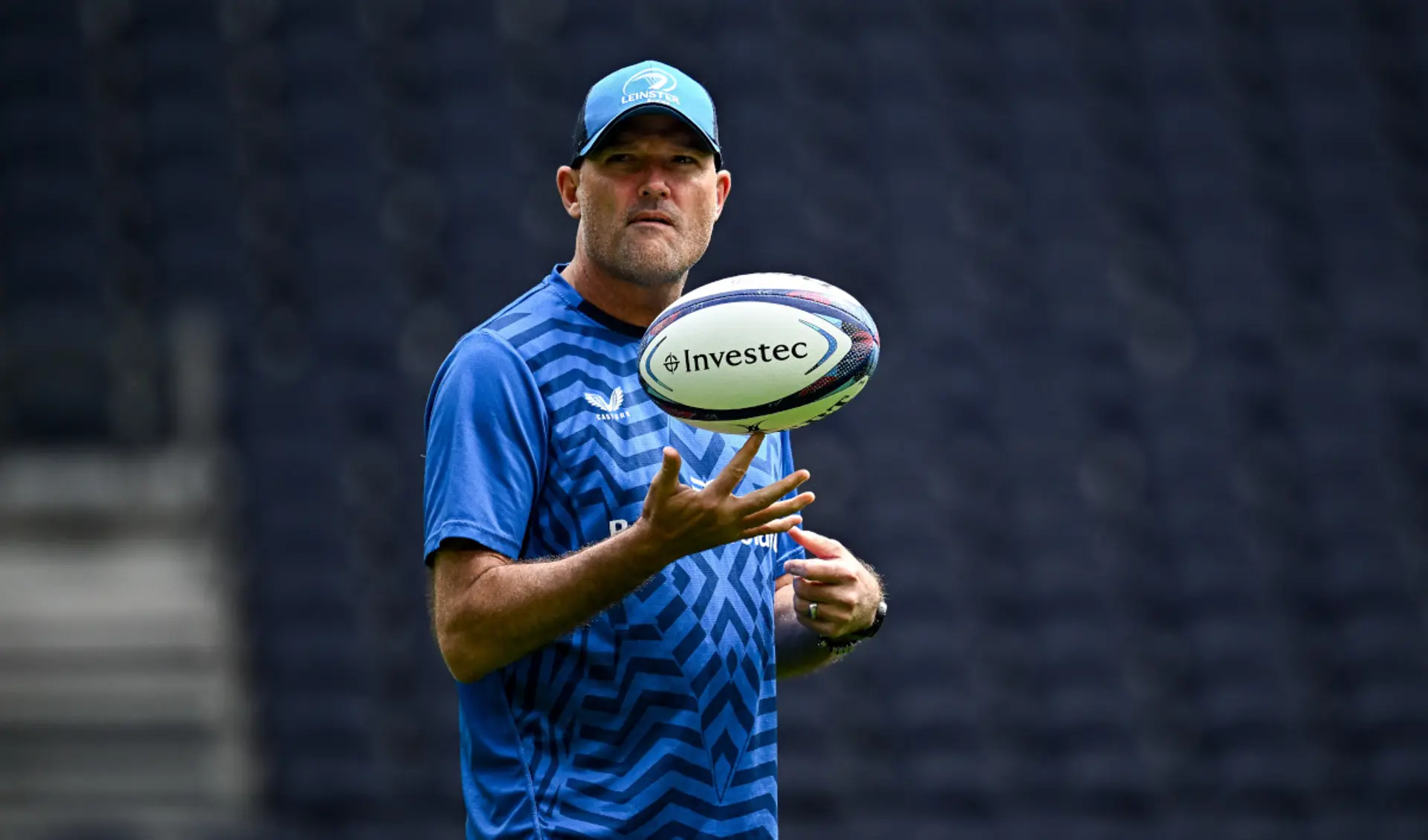Nienaber dismisses 'mental scars' as Leinster refocus on URC

It was always going to be the case that the finger-pointing in the post-mortem after Saturday’s loss to Toulouse in the Investec Champions’ Cup would hit Leinster, but few would have predicted it would be directed at World Cup-winning coach Jacques Nienaber.
The assertion that Leinster lost an epic final because of a concentration on defence has been made by several pundits, asserting that it overshadowed the attack.
So Nienaber fronted up to the Irish media this week, talking straightforwardly about the loss and how it won’t leave mental scars on the Leinster players as they refocus their attention on the Vodacom United Rugby Championship.
Nienaber isn’t one to subscribe to focusing on the negative, and believes you move on after a loss and get better, rather than agonising over something that could have been.
It is understandable that there has been some criticism after Leinster lost their third consecutive Champions Cup final, and their fourth in six years with much of it being misdirected to Leinster’s defence coach because of the perceived lack of attack in the side.
Nienaber, who was head coach when the Springboks won the 2023 World Cup and defence coach in the 2019 victory, believes the only thing Leinster can do is to now focus on their Vodacom United Rugby Championship campaign and bounce back stronger against Connacht in their final league match this coming Friday.
Leinster are in third spot on the log after leading for most of the season and lost ground on their recent tour of South Africa, where they lost both games after fielding a young side with their first-choice players preparing for the Champions Cup semifinals and final.
DISMISSING CONCEPT OF MENTAL SCARS
With the log that could reshuffle to leave them anywhere between first and fourth after this round, Nienaber wants them to bounce back strongly. But talk of mental scarring is something he dismissed outright.
“I can’t think that it would because you work, you get into a final and sometimes you win them and sometimes you lose them, and it is what it is,” Nienaber said.
“Does it build up a question of a mental scar? I don’t know, and my personal take is when the past comes knocking on the door don’t even open it because the past has nothing new to tell you anyway.
“It’s going to tell you that you lost a previous final and it’s got no bearing on what happens tomorrow or the day after. The past is the past and it’s done.
“So I would hope that it wouldn’t leave a scar because it doesn’t. I mean the fact that you had a good game in a World Cup final in 2019 doesn’t mean you’re going to have a good World Cup final in 2023, it’s got nothing to do with it. You have to perform.
“So me personally, I don’t see that and I’d tell that to the players. If the past comes knocking don’t open the door because it’s got nothing new to tell you anyway.”
That no-nonsense approach has served the Springboks well and Nienaber will be looking to instill it this week as Leinster regroup for the URC.
And as he says, only an unemotional look at how they lost the final will suffice rather than what should have been.
"You try to look at it as unemotional as possible," said Nienaber.
"There’s probably three things that stand out as the glaring issues. The first one is, did you win the game? No. That’s the biggest thing and the most important one. Then the second one I would say was our discipline - but not necessarily discipline as in giving penalties away.
"I think we probably were a little bit more disciplined than they were in terms of penalty count but discipline in terms of keeping continuity with ball in hand. We gave too many turnovers away, so that’s what I mean by discipline.
"And then the third is continuity, our breakdown - and there credit should probably go to Toulouse and how they slowed our ball down, so we struggled to generate consistent quick ball, especially when we got into their 22."
GOING WITH THE FLOW
Facing the criticism of Leinster concentrating too much on defence head on, Nienaber dismissed this, saying the team had prepared as they always had for the final.
"When I got here, I thought there were two ways of doing things," he said.
"You can come in and say, 'I prefer the week to flow like this, because it worked when I was with the Springboks, this is how the week-flow went, in terms of sessions, kicking game, defence, attack'.
"Or, I just slot in with how the flow went within Leinster. I chose to go that route, because I always knew how it worked with the Boks and previous teams I was involved in, but I thought to change it mid-season, for me, for the whole team to change for one guy coming in, it didn't make sense.
"Literally, I came into the workflow of the week, and the lads would just say, 'This is normally where we have a block for defence, and the defence that we addressed here was defence from scrums, or defence from lineouts, or defence from kick-chase, or general defence'.
"The lads literally just gave me slots of where they would normally address defence. I just went into that. I just slotted in with the programme, as it was."
Advertisement
